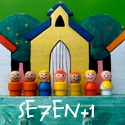Cultures
I enjoyed the diversity of cultures in South Africa. In Tasmania the vast majority of people are of English or European descent, and I rarely hear anyone speak a language other than English. In South Africa there are many official languages, and I often heard people speaking languages I did not understand. When I went to the ATM, I had to choose which language I wanted to read during my transaction. There were about 10 to choose from! The major cultural/racial groups that I learnt about were Indian, English, Afrikaans, and Zulu*.
Durban has a large Indian population, and I enjoyed looking at their distinctive fabrics when I visited a market.
White people in South Africa generally fall into two cultural groups - English and Afrikaans. English people descend from English settlers, and Afrikaans people descend from Dutch settlers. I am sure there are many similarities between them, but there are also differences. Their accents are different, for example. Dave's ancestry is English. Many South Africans speak Afrikaans, including Dave. I have learnt a few words, which I say very poorly! The main word I am familiar with is "skat" which is pronounced "skut". It means treasure.
Dave also speaks some Zulu. This proved a real blessing when we visited a Zulu village called DumaZulu. At the start of our tour a man spoke to us rapidly in Zulu and expected us to respond in his launguage! I was grateful to have Dave to tell me what to say! This village shows the way Zulu people once lived.
We were treated to some vigorous dancing and singing!
The Zulu people are a major tribal group. I visited Zululand, so this is the tribal group I had most contact with. However, there are several other major groups within South Africa. There are also many black refugees from neighbouring countries. I discovered that if you refer to someone as "African" people assume you mean a black person. I found this interesting considering the fact that everyone in South Africa lives on the African continent and could therefore be described as African! People who are not black do not refer to themselves as African. They describe themselves as South African. When I told a Zulu man that my boyfriend was African, I think he thought I had sight problems :).
I admire the way African women balance pots on their heads.
Visiting this village and being confronted with another culture made me more aware of the challenges missionaries must face. It was difficult for me to be spoken to in a foreign language by a person dressed in an unusual way, and I knew I was going on a tour! Imagine if I had been faced with this and I had to work out how to live amongst these people for years with little outside support.
The week after we visited Dumazulu, we enjoyed a monument to the success of another culture. The Voortrekker Monument is in Pretoria, near Johannesburg. It commemerates the Dutch settlers trek from the Cape to the interior of South Africa.
There are many beautiful carvings on the walls inside the building, showing events in the trek. This one shows the English settlers giving the Dutch people who were about to set out a Bible. This Bible and many others are on display in the museum.
There is a strong focus upon the achievements of women. There is a long tapestry which pictures aspects of this, as well as a large statue outside the monument and many carvings such as the one pictured above. It was interesting to visit this monument after the Zulu village, because it featured the conflict of the Dutch settlers with the Zulus. The stone carvings of these events seemed much more alive since we had recently seen Zulu people dressed in a similar way.
It was interesting to visit this monument after the Zulu village, because it featured the conflict of the Dutch settlers with the Zulus. The stone carvings of these events seemed much more alive since we had recently seen Zulu people dressed in a similar way.
Our experiences led us into several discussions about race and culture. While it is wrong to discriminate against people on the basis of their skin colour, it is not wrong to seek to evaluate cultures from a Biblical perspective. One race is not inately better than another, but some cultures are more conformed to a Christian worldview than others are. The Zulu culture still encourages polygamy, which is not God's plan for humanity. The Afrikaans culture has historically oppressed other groups, and this is also a perversion of God's plan. These two examples illustrate that most cultural groups have areas where they need to be transformed through an understanding of the gospel and of the fullness of God's word to us. If one culture is much more conformed to God's word than another, it can justly be said to be a better culture.
*As I write about the cultural groups I encountered, I keep having an uneasy feeling that I am going to get an email from a South African who will tell me I am wrong. I am sure I do have much to learn and I am open to any correction of my facts!








